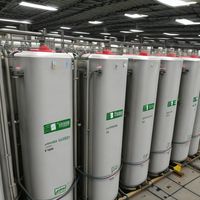Lithium-ion batteries have been a cornerstone of modern technology, powering a vast array of devices from smartphones to electric vehicles. However, the relentless march of technological advancement demands batteries with greater energy density, faster charging capabilities, and longer-lasting power.
This demand has spurred scientists to explore novel battery chemistries and refine existing ones, leading to the emergence of innovative startups aiming to revolutionize battery technology. One such company is Molyon, which has recently emerged from a decade and a half of research at the University of Cambridge with the goal of commercializing a lithium-sulfur battery that promises to offer double the energy density of conventional lithium-ion batteries.
Today, Molyon announced that it has secured $4.6 million in funding to initiate the manufacturing process at its inaugural pilot facility. Lithium-sulfur (Li-S) batteries hold the potential to store significantly more energy than their lithium-ion counterparts and do not depend on scarce minerals such as cobalt, nickel, and graphite. This makes them a promising candidate for enhancing the efficiency of electric vehicles, drones, and aircraft. Despite their potential, the commercialization of Li-S batteries has been hindered by a critical issue: the dissolution of sulfur from the cathode into the electrolyte, which leads to anode corrosion and battery failure after a limited number of charge cycles.
“The potential of lithium-sulfur batteries has been recognized for many years, but realizing this potential has been challenging due to the inherent chemical difficulties associated with sulfur,” said Dr. Ismail Sami, co-founder and CEO of Molyon. To address this challenge, Molyon has developed a cathode technology utilizing metallic molybdenum disulfide (MoS2), a compound composed of sulfur and the abundant element molybdenum found in the Earth’s crust. MoS2 has been shown to maintain stability and deliver high energy density across hundreds of cycles, which could potentially transform the Li-S battery industry.
Dr. Sami, who co-founded Molyon in February of this year with his lab partner Dr. Zhuangnan Li, who serves as the company’s CTO, met while studying under the guidance of the third co-founder, Professor Manish Chhowalla. A fourth co-founder, Dr. Sai Shivareddy, co-founder of Nyobolt, acts as a commercial advisor for the company. Since patenting their groundbreaking discovery, the team has demonstrated practical batteries with energy densities reaching 500Wh per kg—approximately twice that of typical lithium-ion batteries.
With the new influx of funding, Molyon plans to expand its team and focus on developing its pilot facility. Initially, the company will concentrate on producing Li-S batteries for drones and robots, which stand to benefit significantly from the reduced weight and enhanced range. Following this, Molyon intends to scale up its operations to cater to electric vehicles, trucks, and aircraft.
Molyon’s funding round, its first, was co-led by IQ Capital, a London-based deep tech investor, and Plural, a founder-led VC firm that launched a €500 million fund earlier this year. “The UK is in a unique position to take the lead in lithium-sulfur technology,” wrote Carina Namih, partner at Plural, in a blog post. “We are already among the world’s leading innovators in this emerging field, with top-tier labs and researchers based here. The UK also possesses the talent pool and the experience gained from previous attempts to commercialize this technology—often, as is the case with technological progress, the insights from these failures will fuel the next wave of innovation.”
